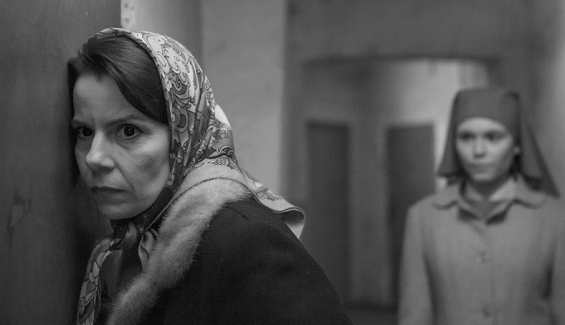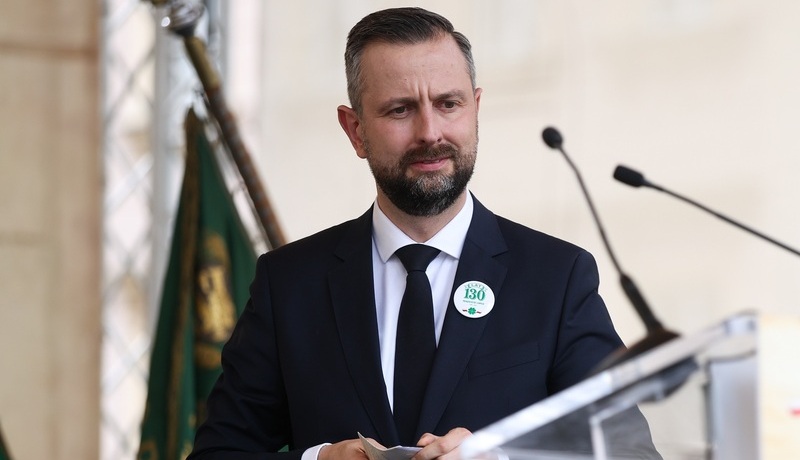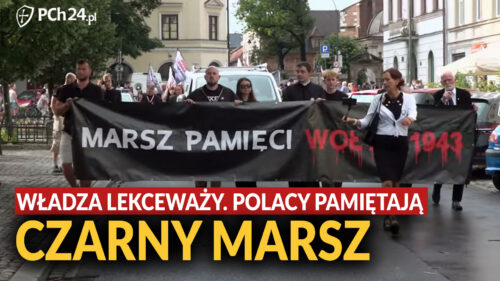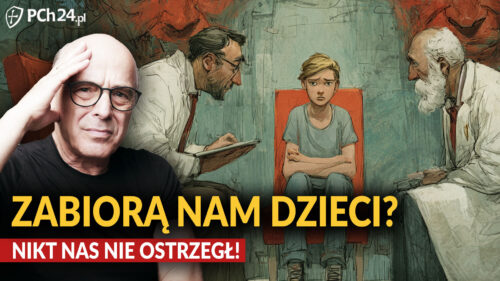The film “Ida”, which is inspiring awe in Polish salons, is nothing more than an extremely nasty tale that seeks to justify a Communist criminal. What will the small world of European political and cultural circles think, when its representatives see this movie? That Poles are savages, hungry for Jewish blood and money, who simply deserved death at the hands of the red butchers.
The joyous echoes of trumpets heralding a series of European awards for Paweł Pawlikowski’s film have not yet died down and we can already hear news of another prospect for the film – an Oscar. Possibly even more than one. After all, besides the award forBest Foreign Language Film there is also reportedly a chance for Agata Kulesza to receive the award for Best Supporting Actress for her role of a Communist public prosecutor. All this is aimed at ,surprisingly, promoting Poland. And so, delighted with the continuing success of the film, comments by foreign critics, the applause of non-Polish audiences, many of our fellow countrymen remark with satisfaction that once again we have been noted by the world and, after all, one can still fall in love with Polish cinema.
Wesprzyj nas już teraz!
Hogwash, Ladies and Gentlemen! Although “Ida” is well produced, it is not a Polish film, and anyone, whose heart trembles at the sound of the word “homeland” has to realize that the success of Pawlikowski’s film is an element of a campaign brought to us by the “elites of the Third Republic of Poland”. This campaign runs under the slogan “let’s foul our own nest.”
Oh, a poor mass murderer…
What is “Ida” about? It is about whitewashing the murderers of Poles who fought against the Communist regime. Unofficially, that is so. On the surface, the film is intended to be a sort of reflective nourishment for connoisseurs: a dramatic storyline smacking of typical, European-style psychological cinema à la our very own Kieślowski, pictured in grim, black-and-white frames.
A girl, piously preparing for her perpetual vows, discovers that she has an aunt. Her superior orders her to meet the aunt without fail before she decides about her future. Let us pass over the absurdity of this whole situation, because everything that takes place later in the film is overshadowed by the initial scenes. The unknown aunty is a Communist murderer, who sent “Polish bandits” to their deaths. But she is neither a beast in human skin, a demonic persona nor even an elderly Communist villain, reluctant to wash innocent blood off her hands like Jakub Berman in his conversation with Teresa Torańska. She does not even want to cry or repent, when in the company of her dedicated to God niece she comprehends the heinous things she has done in her lifetime. Nothing of the sort! Such an outlined profile could create an impression that we are dealing with a Polish film. As stated above, “Ida” is no such thing.
The bloody aunty is in essence a fragile being, shaped by traumatic wartime experiences. As a Jewish woman, she lost a child and a sister and all that because of…Poles. They murdered and buried her loved ones in a forest, despite previously sheltering them from the watchful eye of the occupier. Since they sheltered them, we can presume: they killed for a profit. Hence, an admission made to her niece about sending Polish bandits to their deaths sounds more like a confession of a wounded, suffering woman rather than of a willing accomplice to bloody Communist crimes.
What will the European cultural and political elite take away after seeing “Ida”? That Poles are money-hungry savages, practically animals, who the Communists did torment, true, but only after suffering at the hands of the beasts. Perhaps I am exaggerating? Please see the movie for yourself and observe how Pawlikowski, while trying to impress the audience with the stuffy, alcohol induced and smoke filled atmosphere of Communist Poland, cleverly swaps the role of executioners with that of victims. History has no significance here. The Underground State? Żegota? Righteous Among the Nations? To hell with them! There is only the Polish despicable village, full of apish peasants harboring a sincere hatred of the Jews. It is these peasants that have created a monster: a Communist public prosecutor in search of personal vengeance.
In the above thread, a more crucial one, yet not less shocking, disappears: the would-be nun, when learning the “truth” about her ancestry and the tragic end of her close ones, fulfills the will of her wounded aunt and begins to take in the pleasures of a frolic life.
Lie after lie
As in the case of many others dealing with similar themes, what terrifies most in Pawlikowski’s narrative is not an attempt to try and justify crimes perpetrated by Jewish Communists, but the countless number of outright lies! In “Ida”, everything is literally turned upside down, while boasting about managing to cook up such a masterpiece. Although it is a technically well produced film, with a plot, which despite fitting nicely into a popular current of “moral anxiety” is in fact a crappy steak, served cold with gravy.
Many books and research articles dealing with instances of Poles killing Jews during the Second World War have been published up to now. It is no use to write about it here extensively. However, what is worth mentioning is a small and inconvenient for Pawlikowski historical “surprise”, about which – oh, the irony! – he can read in every elementary school textbook. As luck would have it, already in 1939 the first attempts were made to create an Underground State, which – like any normal country – would have a coherent legal system. The law of the Polish Republic (which might seem trivial, but one must repeat such obviousness) forbade any kind of murders, except when directed at the occupiers and traitors. Taking lives of innocent people was severely punished. Did Jews die at the hands of Poles? Of course, there were cases of crimes committed by a variation of degenerates. However, turning this into a mainstream historical narrative can be compared to a collection of statistics on patricide in Poland in the last two decades being turned into a cinematic “hit” about Poland, a country where fathers are murdered wholesale.
Enough about real or imagined murders committed by Poles against Jews. After all, what seems more interesting is the theme of whitewashing the red murderers, systematically and with ruthless determination killing our ancestors who fought for the independence of Poland. The prototype for the film public prosecutor was to be Helena Wolińska. Who is she? A classic and illustrious “product” of Soviet aggression on the Polish territory. She deprived many of our heroes of their freedom, including General August Fieldorf a.k.a “Nil”. She usually did it in a way that broke even the detestable, Stalinist law. Of course, those deprived of their freedom by this heinous character were not sent to a warm cell, but they landed in prisons run by the notorious Department of Security (UB), being tortured day and night by their oppressors. Some of them,like “Nil”, were murdered.
Wolińska was in any case an exceptionally vile, disgusting, totally degenerated Communist. While serving in the ranks of the People’s Army (AL) during the war, she fulfilled the perverse desires of her senior “comrades”, becoming a “transitive field wife”, as explained by UB Col. Anatol Fejgin. Perhaps those personal experiences of hers influenced her subsequent interests. In Soviet-occupied Poland, in addition to combating the armed patriotic underground, she was involved in “scholarly” work, producing a doctoral thesis entitled “Abortion in light of the penal law.”
There is also another interesting element in Wolińska’s biography…during the war she managed to survive the horror of the Warsaw Ghetto. As a public prosecutor, literally playing the role of lord of life and death at the behest of Soviets, she imprisoned Władysław Bartoszewski, who was actively engaged in saving Jewish lives in the underground movement. Many years later, Bartoszewski would also serve as Poland’s foreign minister for two terms.
In spite of the media euphoria, there will be nothing to celebrate if “Ida” receives an Oscar. This film is an affront to Poland andit has nothing to do with our history, our problems and our heroes. The mere fact of its making (i.e. financing) makes one wonder “why now?,” especially in the context of historical facts recently discovered by journalists and researchers, which were a taboo for quite some time. Indeed, we are still awaiting films that will show Poles and the world the lives of our valiant warriors, who fought two horrible aggressors over half a century ago. When compared with the biographies of Pilecki, Fieldorf, Szendzielarz, Fr. Gurgacz, Piwnik, and Siedzikówna, how does a tale of a Polish-speaking murderer of Jews and a public prosecutor torn by an oppressive dilemna look like? Pitiful… And exceptionally disgusting.
Krzysztof Gędłek













